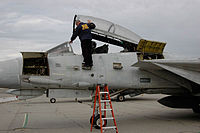- Defense Criminal Investigative Service
-
Defense Criminal Investigative Service Abbreviation DCIS Seal of the Defense Criminal Investigative Service. Agency overview Formed 1982 Employees Approximately 400 (2011) Legal personality Governmental: Government agency Jurisdictional structure Federal agency United States General nature - Federal law enforcement
- Civilian agency
Operational structure Headquarters Arlington, Virginia Agency executives - James B. Burch, Deputy Inspector General for Investigations
- G. Tracy Burnett, Assistant Inspector General for International Operations
- James R. Ives, Assistant Inspector General for Investigative Operations
Parent agency Office of the Inspector General, U.S. Department of Defense Website www.dodig.mil/INV/DCIS The Defense Criminal Investigative Service is the criminal investigative arm of the Office of the Inspector General, U.S. Department of Defense. DCIS protects military personnel by investigating cases of fraud, bribery, and corruption; preventing the illegal transfer of sensitive defense technologies to proscribed nations and criminal elements; investigating companies that use defective parts in weapons systems and equipment utilized by the military; and stopping cyber crimes and computer intrusions.
Contents
Background
DCIS serves as the criminal investigative arm of the Department of Defense Inspector General. DoD IG was created in 1982 by an amendment to the Inspector General Act of 1978.
Responsibilities
It is the obligation of the DoD Inspector General to "initiate, conduct, and supervise such...investigations in the Department of Defense (including the military departments) as the Inspector General considers appropriate" (IG Act Sec. 8(c)(2)) and to "provide leadership and coordination and recommend policies for activities...to prevent and detect fraud and abuse in...[DoD] programs and operations (IG Act Sec. 2(2))."
Priorities
DCIS current investigative priorities include:
Significant fraud and corruption impacting crucial DoD operations throughout Southwest Asia, with particular emphasis upon schemes that potentially affect the health, safety, welfare, or mission‐readiness of U.S. troops assigned to theater.
Significant procurement and acquisition fraud, corruption, and other financial crimes which result in multi‐million dollars losses, thus depriving DoD of critically‐needed funds that would otherwise be utilized to finance vital national defense initiatives.
Defective, substituted, counterfeit, or substandard products introduced into the DoD acquisition system, with particular emphasis upon allegations involving troop safety[1] and/or mission‐readiness.
Illegal theft, export, diversion, transfer, or proliferation of sensitive DoD technology, systems, weapons, and equipment, with particular emphasis upon allegations involving targeted foreign nations, organized international criminal organizations, or potentially hostile entities apt to utilize said items in furtherance of assaults against U.S. military forces.
American Recovery and Reinvestment Act‐related fraud, waste, and abuse involving funds allocated to DoD, with particular emphasis upon criminal activity involving projects designed to improve the quality of life of service members and their families.
Health care fraud committed by providers that involves (a) quality of care, unnecessary care, or failure to provide care to TRICARE‐eligible service members, retirees, dependents, or survivors; or (b) significant direct loss to DoD’s TRICARE Management Activity.
Computer intrusions and other cyber crimes that result in (a) serious compromises of the Global Information Grid; (b) exfiltration of sensitive DoD data or large volumes of personally identifiable information pertaining to civilian DoD employees or service members; or (c) potential contractual violations on the part of a DoD contractor.
Organization
DCIS is lead by the Deputy Inspector General for Investigations and organized into three functional branches. Each branch is managed by an Assistant Inspector General.
- Investigative Operations
- International Operations
- Internal Operations
Locations
DCIS is headquartered in Arlington, Va. DCIS operates field offices in the following locations:
- Central Field Office, Missouri
- Mid Atlantic Field Office, Virginia
- Northeast Field Office, Pennsylvania
- Southeast Field Office, Georgia
- Southwest Field Office, Texas
- Western Field Office, California
In addition, DCIS is located overseas in the following locations:
- Bagram Air Base, Afghanistan
- Baghdad, Iraq
- Kuwait City, Kuwait
- Wiesbaden, Germany
Special Agents
DCIS is composed of special agents who have full law enforcement authority; they make arrests, carry concealed weapons, execute search warrants, serve subpoenas, and testify in legal proceedings.
Selection and training
To be considered for a DCIS special agent position, an individual must:
- Be a U.S. citizen
- Be between 21 and 37 years of age
- Pass the complete applicant screening process, which includes an interview battery, drug screening, medical exam, and a physical fitness test
- Pass an extensive background investigation
- Possess exceptional communication skills
DCIS special agent candidates initially receive training at the Federal Law Enforcement Training Center located in Glynco, Georgia. They attend FLETC's basic training course for special agents, the Criminal Investigator Training Program, which lasts about 13 weeks and represents the beginning or basic training received by DCIS special agents. Later, agents may return to FLETC to attend specialized training in contractor fraud, money laundering, computer crimes, advanced interview techniques, etc.
DCIS in media
- In the 2010 film The A-Team, the character Charissa Sosa is a DCIS agent.
- On the SyFy channel television series Alphas, the main characters work under the auspices of the DCIS.
- In P.T. Deutermann's novel, Zero Option (1999), DCIS special agent David Stafford investigates the theft of a container of a deadly biological nerve gas stolen from an Army base.
- In Brian Haig's novel, The Capitol Game (2010), DCIS special agent Mia Jenson investigates a scheme involving a contractor that develops a polymer coating that can be used on military equipment to provide a protective layer impenetrable to modern weaponry.
See also
- United States Department of Defense
- Office of the Inspector General, U.S. Department of Defense
- Department of Defense Whistleblower Program
- United States Army Criminal Investigation Command
- U.S. Army Counterintelligence
- Naval Criminal Investigative Service
- U.S. Air Force Office of Special Investigations
- Federal Law Enforcement Training Center
- Law enforcement agency
- Inspector General
References
- ^ In the event an investigation reveals potentially life‐threatening circumstances, the case immediately becomes a top priority.
External links
Categories:- Federal law enforcement agencies of the United States
- United States Department of Defense agencies
Wikimedia Foundation. 2010.





